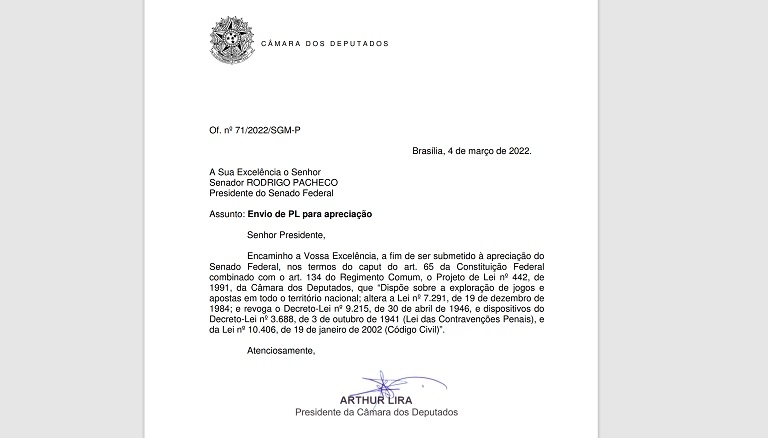

"I forward it to Your Excellency (Senator RODRIGO PACHECO - President of the Federal Senate), in order to be submitted to the Federal Senate for consideration, pursuant to the caput of art. 65 of the Federal Constitution combined with art. 134 of the Common Rules, Bill No. 442, of 1991, of the Chamber of Deputies, which provides for the exploitation of gaming and betting throughout the national territory; amends Law No. 7,291, of December 19, 1984; and revokes Decree-Law No. 9,215, of April 30, 1946, and provisions of Decree-Law No. 3,688, of October 3, 1941 (Criminal Misdemeanors Law), and of Law No. 10,406, of January 19, 2002 (Civil Code),” reads the letter that Lira sent to Pacheco on Friday (4).
Even without consensus, the proposal - which has been going through Congress for more than 30 years and legislates on casinos, bingo, jogo do bicho and online gaming - begins to be discussed in the coming weeks.
Because of the controversy, the forecast is that Bill 442/91 will pass through several committees before reaching the Plenary, and a special committee may be created for the discussion. It is up to the president of the Senate, Rodrigo Pacheco (PSD-MG), to decide.

The evangelical bench choruses against legalization. Within Pacheco's party, the assessment is of difficulty in approving the text, which requires extensive debate. The largest bench in the Senate, the MDB should take a majority position against the matter. The CNBB (from the National Conference of Bishops of Brazil) has also articulated itself to bar the debate.
The deputy leader of the government, senator Carlos Viana (MDB-MG), has already spoken out against it. “International experience shows that large casinos are used for money laundering, drug trafficking and prostitution. The inspection of this sector is very difficult,” justified Viana, considering that, despite legalization having the potential to bring revenue to the country, the losses with increased spending on public health and the fight against organized crime would not compensate.
The leader of Podemos, Alvaro Dias (PR), has not yet confirmed an orientation from the bench and believes that an extensive debate will take over the corridors as of Tuesday, and there may be an articulation capable of moving the matter forward. Within the party, however, there are senators who are already moving behind the scenes to stop the proposal, as is the case of Eduardo Girão (CE).
Without a defined orientation from the base, even if the project passes, the expectation is that it will be vetoed by President Jair Bolsonaro. Publicly, he has said he will not legalize gaming, but believes the veto can be overturned by Congress. In contrast to the negative, the government has not moved to prevent the proposal from gaining strength in the Senate, increasing the possibility of a future approval, as happened in the Chamber.
Senator Angelo Coronel (PSD-BA) appears as a spokesperson in favor of the issue within the Senate and is already beginning to articulate, including alongside Pacheco, a party colleague, in an attempt to unblock the debate. “I will defend, I am in favor of legalization. The world's economic powers, with the exception of Indonesia and Saudi Arabia, which make up the G20, all have legal gaming, as do the Mercosur countries, with the exception of Brazil. We have to treat gaming as an economic activity, not as custom,” he argued to R7.
The PSD, however, still does not have a position. “The topic requires a broad and in-depth debate and we will dedicate ourselves to studying the project within the PSD,” says the bench.
Source: GMB